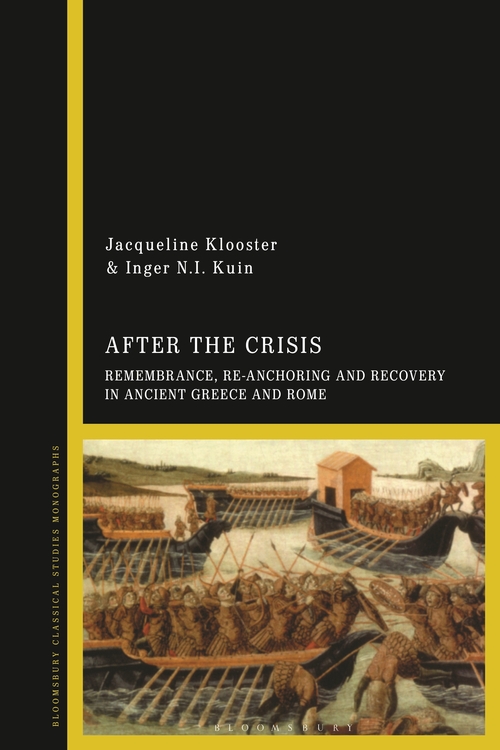Remembrance, Re-anchoring and Recovery in Ancient Greece and Rome
Crises resulting from war or other upheavals turn the lives of individuals upside down, and they can leave marks on a community for many years after the event. This volume aims to explore how such crises were remembered in the ancient world, and how communities reconstituted themselves after a crisis. Can crises serve as catalysts for innovation or change, and how does this work? What do crises reveal about the ‘normality’ against which they are defined and framed?

People living in post-crisis societies have no choice but to adapt to the changes caused by crisis. Such adaptation entails the question of how the relationship between the pre-crisis situation and the new status quo is constructed, and by whom. Due to the reduced possibility of using the immediate past, which is tainted by conflict and bad memories, it may involve revisions of historical narratives about communal pasts and identities, through the selection of new ‘anchors’, and sometimes even a discarding of the old ones.
Crises affect all areas of life, and crisis recovery likewise spans different spheres. This volume finds traces of such recovery strategies in texts as well as visual representations; in literary as well as in documentary texts; in official ideology as much as in subaltern responses. The contributors bring together the diverse testimonies for such ways of coping that have survived from antiquity.
“The volume’s greatest strength is the quality of the individual contributions; every chapter is well-written and cogently argued, and they all make significant interventions in the specific topics they investigate… Another major contribution of the volume is that it is one of the opening salvos in what we might call an affective turn in the study of the ancient world. A key theme that many of the chapters touch on is that history functions as a site not just for critical engagement with the past but for emotional engagement with it as well… To summarize, Klooster and Kuin’s volume represents an important contribution to the study of classics and ancient history. As mentioned above, many of the individual chapters will become essential works in their particular subfields.”
Dominic Machado in Polis: The Journal for Ancient Greek and Roman Political Thought
Table of Contents
Acknowledgements
Part I: Crisis: Concepts & Ideology
1) Introduction: What is a Crisis? Framing versus Experience
Jacqueline Klooster (University of Groningen, Netherlands) and Inger Kuin (Dartmouth College, USA)
2) (Not) talkin’ bout a revolution: Managing constitutional crisis in Athenian political thought
Tim Whitmarsh (University of Cambridge, UK)
3) Security: calming the soul political in the wake of civil war
Michèle Lowrie (University of Chicago, USA)
Part II: Crisis Traumas & Recovery: Greece
4) Tragedies of War in Duris and Phylarchus: social memory and experiential history
Lisa Hau (Glasgow University, UK)
5) Changes of Fortune: Polybius and the Transformation of Greece
Andrew Erskine (Edinburgh University, UK)
Part III: Crisis Traumas & Recovery: Rome
6) Coping With Crisis: Sulla’s Civil War and Roman Cultural Identity
Alexandra Eckert (Oldenburg University, Germany)
7) Alternative Futures in Lucan’s Bellum Civile: Imagining Aftermaths of Civil War
Annemarie Ambühl (Mainz University, Germany)
Part IV: Resolving Civil War
8) Caesar and the Crisis of Corfinium
Luca Grillo (University of North Carolina, USA)
9) Young Caesar and the Termination of Civil War (31–27 BCE)
Carsten Hjort Lange (Aalborg University, Denmark)
10) Agrippa’s odd Speech in Cassius Dio’s Roman History
Mathieu de Bakker (University of Amsterdam, the Netherlands)
Part IV: Civil War & the Family
11) The Fate of the Lepidani: Civil War and Family History in First Century BCE Rome
Josiah Osgood (Georgetown University, USA)
12) The Roman Family as Institution and Metaphor After the Civil Wars
Andrew Gallia (University of Minnesota, USA)
“In fact, crisis, in the everyday political, cultural and social sense by which it is understood by many today, is a modern invention. The choice to utilise such a weighty and irreducible concept to read events of the Classical past is a welcome one, as the ubiquity of trouble and trauma in Greco-Roman history justifies continuous comprehensive attention with a view to understanding pivotal events as public and/or private crises.… Klooster and Kuin, along with their contributors, adopt an appropriately modern approach to the concept.”
Hannah-Marie Chidwick in Classical Review
“[T]he volume as a whole came together well and the contributions not only interact with one another, but also individually tend to advance the discussion. As a result it is certain to stimulate further work. This volume elegantly deals with the topic of crisis and its sequel in a coherent and insightful manner that makes it extremely useful for courses and seminars at the graduate and post-graduate level. With its focus on the political and socio-cultural trauma of civil war and conquest, this volume constitutes a significant contribution to trauma and memory studies.”
